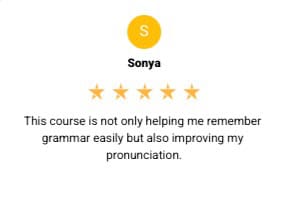10 Advanced Phrasal Verbs for IELTS Speaking
👇 Take this lesson with you! 👇
Table of Contents
Topic of work / phrasal verbs to talk about study
To knock off = to finish work
This phrasal verb actually has several different meanings, including;
To knock $5 off a product = to reduce the price by $5
To knock off someone – to murder (or kill) someone
The meaning I want to share with you related to work, is where it means ‘to finish work’, for example;
I knock off at 7pm = I finish work at 7pm
I’m knocking off early today, it’s Friday!
Learning Tip #1
- When a word ends in a consonant sound and the next word starts with a vowel, we often link the two words.
- Most prepositions start with a vowel, so most phrasal
verbs can be linked. - For example, ‘knock_off’ can be pronounced as one word
/nɒkɒf/
- Likewise in the past tense, ‘knocked_off’ can be pronounced as one word
/nɒktɒf/
To chip in = to interrupt by adding a comment
You may know ‘chips’ as something you eat, but what about ‘chip in’?
Well, it means ‘to interrupt’, so we can use this in a meeting.
Imagine, there you are, in a meeting, listening to some colleagues ‘rabbiting on’ (talking non-stop about something boring), and you want to interrupt…
…so you can say,
Excuse me, can I just chip in?
We can also use this to talk about other peoples’ contributions in the meeting
He chipped in with some good ideas

To hash out something = To talk about something with
someone in order to reach an agreement
You probably know hashtag, right?
#SpeakEnglish
You may even know the food, made of potatoes, called ‘hash browns’.
But, to ‘hash out’ has a different meaning.
It’s used when you are talking to someone, discussing an idea, and trying to agree.
Let’s see some examples.
We need to hash out the details of our presentation
My wife and I spent hours hashing out our holiday plans last night
Topic of people
To wind someone up = to annoy someone
You have probably heard me say – ‘let’s wind up here’
When I come to the end of a class, and this means
- Let’s wind up = let’s finish
However, ‘to wind someone up’ means to annoy or upset a person by doing or saying something.
Here are 2 examples,
She really winds me up when she says teachers have an easy life, she is so wrong!
I hate talking to Tom, he always winds me up
To make someone out = see, hear or understand
something / someone
- I can’t make out your handwriting = it’s unclear and so I cannot understand it.
- I can’t make you out = I don’t understand your behaviour
Here is an example,
You say you want more space, then you say let’s live together! I really can’t make you out!
Learning Tip #2
- When learning vocabulary, use a picture to help you remember the meaning.
- For example, imagine two people discussing and trying to agree about what to do with a hash brown.
- This image can help you remember the phrasal verb ‘to hash out’
Phrasal verbs to talk about places
To do up = decorate (a room, house, flat)
I have just done up the bathroom and it looks as good as new
To drop in (on) to visit someone/place – usually without
planned invitation
I am visiting New Delhi next week, I might drop in on you.
We could drop in on the pub on the way home after work.
Can I drop in on you tomorrow?
Other ways of saying ‘to visit’
I dropped in on Jacob
I went round to Jacob’s (house)
I went over to Jacob’s
I popped round to Jacob’s (U.K.)
I popped over to Jacob’s (U.K.)
Phrasal verbs to describe events
To turn out = to happen in a certain way
My presentation turned out badly, I forgot everything
That new recipe turned out really well
Be careful!
I turn out my presentation ❌
My presentation turns out ✔️
To go off = to happen in a particular way (usually good)
The meeting went off well
My presentation went off well
Learning Tip #3
- When learning new vocabulary, especially phrasal verbs, practice by making a phrase in the present and in the past!
- This will help you memorise the word better, and build your fluency and flexibility.
Here is a simple template.
- Usually ____, but yesterday ____
And here are some examples,
Usually, my presentations turn out well, but yesterday, it turned out badly.
Usually, my cooking turns out well, but yesterday, it turned out badly.

Phrasal verbs to talk about activities
You probably know ‘to take up a hobby’ but what about ‘to take to’ a hobby?
To take up (a hobby) = to begin
To take to (a hobby) = to enjoy a lot and do it well
My daughter started aikido recently and she took to it really well.
When I was younger I took up rock climbing and I took to it really quickly
To show off = to do something trying to show others how
good you are (in an annoying way)
At school, the teacher’s pet was always showing off.
To rub someone up the wrong way = to annoy
someone (without intending to)
When the teacher’s pet shows off, it rubs me up the wrong way
Bonus
My favourite phrasal verbs of all time!
I love this phrasal verb, partly because I love sleeping, but also because I just love the sound of it!
To nod off = To fall asleep
The meeting was so boring, I nodded off!
Improve your Speaking Skills with this Free Course
Crack IELTS Speaking Part 1
Learn to Speak with Confidence in Part 1 of Your IELTS Test!
⭐️⭐️⭐️⭐️⭐️
‘It’s such a great course. I’ve learned so many usages for speaking part 1.’
Zu Htet





